- Home
- Mitch Albom
The First Phone Call From Heaven: A Novel Page 2
The First Phone Call From Heaven: A Novel Read online
Page 2
“This the town you grew up in?”
“Now you know why I left.”
“How are you getting by?”
Sully shrugged.
“Look. It’s awful. What happened with Giselle . . .”
“Yeah.”
“I’m sorry.”
“Yeah.”
“I thought they’d let you out for the funeral.”
“‘Navy rules rule the navy.’”
“It was a nice service.”
“I heard.”
“As far as the rest . . .”
Sully glanced up.
“The hell with it,” Mark said. “People know.”
They know you went to prison, Sully thought, finishing the unfinished sentence. They don’t know if you deserved it.
“I tried to come see you.”
“Didn’t want to be seen.”
“It was weird for the guys.”
“Doesn’t matter.”
“Sully—”
“Let’s drop it, OK? I already said what happened. A million times. They believed something else. End of story.”
Sully stared at his hands and punched his knuckles together.
“What are you planning next?” Mark asked.
“What do you mean?”
“For work?”
“Why?”
“I know a guy near here. College roommate. I called him.”
Sully stopped punching his knuckles.
“You called before you saw me?”
“You’re gonna need money. He might have a job.”
“Doing what?”
“Sales.”
“I’m not a salesman.”
“It’s easy. All you do is sign customers back up, collect a check, and get a commission.”
“What kind of business?”
“Newspaper.”
Sully blinked. “You’re kidding, right?” He thought about all the newspapers that had written about his “incident,” how quickly they had jumped to the easiest, fastest conclusion, reprinting each other’s words until they had devoured him, then moving on to the next story. He’d hated the news ever since. Never paid for another newspaper, and never would.
“It lets you stay around here,” Mark said.
Sully went to the sink. He rinsed out a glass. He wished Mark would go, so he could fill it with what he wanted.
“Give me his number, I’ll call him,” Sully said, knowing full well he never would.
Tess sat cross-legged on soft red cushions and stared out the bay window to the large front lawn, which hadn’t been mowed in weeks. This was the house she had grown up in; she remembered, as a child, curling in this very spot on summer mornings, whining to her mother, Ruth, who sat at a bridge table, reviewing her paperwork, rarely looking up.
“I’m bored,” Tess would say.
“Try going outside,” Ruth would mumble.
“There’s nothing to do.”
“Do nothing outside.”
“I wish I had a sister.”
“Sorry, can’t help you.”
“You could if you got married.”
“I was already married.”
“There’s nothing to do.”
“Try reading a book.”
“I read all the books.”
“Read them again.”
On and on they went, a jousting conversation that in some form repeated itself through adolescence, college, adulthood, right up until Ruth’s final years, when Alzheimer’s robbed her of her words, and ultimately of the desire to speak at all. Ruth spent her final months in a stony silence, staring at her daughter with her head tilted, the way a child stares at a fly.
But now, somehow, they were talking again, as if death had been an airplane flight that Tess thought Ruth had taken but later found out she’d missed. An hour earlier, they’d shared another inexplicable phone call.
“It’s me, Tess.”
“Oh, God, Mom. I still can’t believe this.”
“I always told you I’d find a way.”
Tess smiled through tears, remembering how her mother, a health food devotee, used to joke that even dead, she’d make sure Tess was taking her supplements.
“You were so sick, Mom.”
“But there is no pain here.”
“You suffered so much—”
“Honey, listen to me.”
“I’m here. I’m listening.”
“The pain you go through in life doesn’t really touch you . . . not the real you. . . . You are so much lighter than you think.”
Just the words brought Tess a blessed calmness now. You are so much lighter than you think. She glanced at the photo in her hands, the last photo of them together, taken at her mother’s eighty-third birthday party. You could see the price the illness had exacted—Ruth’s hollowed cheeks, her blank expression, the way her caramel sweater drooped on her skeletal frame.
“Mom, how is this possible? You’re not using a phone.”
“No.”
“How are you speaking to me?”
“Something has happened, Tess. . . . There’s an opening.”
“An opening?”
“For now.”
“How long will it last?”
A long pause.
“Mom? How long will it last?”
“It won’t.”
Miracles happen quietly every day—in an operating room, on a stormy sea, in the sudden appearance of a roadside stranger. They are rarely tallied. No one keeps score.
But now and then, a miracle is declared to the world.
And when that happens, things change.
Tess Rafferty and Jack Sellers might have kept their calls secret, but Katherine Yellin would not. Proclaim the good news to all mankind. That’s what the gospel said.
And so, on a Sunday morning, twenty-three days after Coldwater’s first mysterious phone call, Pastor Warren stood before his Harvest of Hope congregation, flipping pages in his Bible, unaware that his sanctuary was about to be transformed forever.
“Let us read together from Matthew, chapter eleven, verse twenty-eight,” he announced, blinking. The print was blurry, and his fingers shook with age. He thought of the psalm: Do not forsake me when I am old and gray.
“Excuse me, everyone!”
Heads turned. Warren peered over his glasses. Katherine was standing in the fifth row. She wore a brimmed black hat and a lavender dress. In her hands, she clutched a piece of paper.
“Pastor, I’m sorry. The spirit of the Lord compels me to speak.”
Warren swallowed. He feared where this was going.
“Katherine, please be seated—”
“This is important, Pastor.”
“Now is not the—”
“I have witnessed a miracle!”
A small gasp rippled through the pews.
“Katherine, the Lord is with us all, but claiming a miracle—”
“It happened three weeks ago.”
“—is a very serious matter—”
“I was in the kitchen, Friday morning.”
“—best left to the leaders of the church.”
“I got a phone call—”
“Really, I must insist—”
“—from my dead sister!”
More gasps. She had their attention now. The sanctuary was so quiet, you could hear her unfold the paper.
“It was Diane. Many of you knew her. She died two years ago, but her soul is alive in heaven. She told me!”
Warren fought to keep from shaking. He had lost control of the pulpit, a sin, in his mind, of the highest order.
“We first spoke that Friday morning,” Katherine continued, reading louder as she wiped tears with the back of her hand. “It was 10:41 a.m. And the next Friday, at 11:14 a.m., and last Friday at 7:02 in the evening. She said my name . . . she said . . . ‘Kath, the time has come to tell everyone. I’m waiting for you. We are all waiting.’”
She turned to the rear of the sanctuary. “We are all waiting.�
�
The congregation mumbled. From the pulpit, Warren watched them shifting in their seats, as if a wind were blowing through them.
He rapped his palm on the lectern.
“I must insist!” Rap. “Please! Everyone!” Rap, rap! “With all respect to our fellow congregant, we cannot know if this is real—”
“It is real, Pastor!”
A new voice came from the back of the church. It was deep and gravelly, and all heads turned to see a tall, burly man in a brown sports coat, standing up, his large hands on the pew in front of him. He was Elias Rowe, a longtime African American congregant who owned a construction business. No one could recall him ever speaking to a crowd—until now.
His eyes darted. When he spoke again, his voice was almost reverent.
“I got a call, too,” he said.
The Fourth Week
No one is certain who invented the telephone. Although the U.S. patent belongs to the Scottish-born Alexander Graham Bell, many believe he stole it away from an American inventor named Elisha Gray. Others maintain that an Italian named Manzetti or a Frenchman named Bourseul or a German named Reis or another Italian named Meucci deserves credit.
What few dispute is that all these men, working in the mid-nineteenth century, explored the idea of transmitting vocal vibrations from one place to another. But the very first telephonic conversation, between Bell and Thomas Watson, standing in separate rooms, contained these words: Come here. I want to see you.
In the uncountable human phone conversations since then, that concept has never been far from our lips. Come here. I want to see you. Impatient lovers. Long-distance friends. Grandparents talking to grandchildren. The telephone voice is but a seduction, a bread crumb to an appetite. Come here. I want to see you.
Sully had said it the last time he spoke to Giselle.
He’d been awakened at 6:00 a.m. in his Washington hotel room by a senior officer, Blake Pearson, who was supposed to fly an F/A-18 Hornet jet back to the West Coast. He was sick. Couldn’t do it. Would Sully cover? He could stop in Ohio if he wanted, see Giselle for a few hours—she and Jules were there visiting her parents—then continue on. Sully quickly agreed. It would break up his two weeks of reserve duty. And the unexpected family visit would make the long hours of flying worthwhile.
“You can be here today?” Giselle said sleepily when he’d called her with the news.
“Yeah. In, like, four hours.”
“You really want to?”
“Of course. I want to see you.”
Had he known what would happen that day, he would have changed everything, never flown, never talked to Blake, never even woken up. Instead, his last telephone conversation with Giselle ended much like the world’s first.
“I want to see you, too,” she said.
Sully thought about that now as he turned the ignition in his father’s Buick Regal, a nine-year-old car that mostly sat in the garage. That was the last time he’d flown a plane. The last time he’d seen an airport. The last time he’d heard his wife’s voice. I want to see you, too.
He steered out of his parents’ driveway and drove to Lake Street, the main drag of town, passing the bank and the post office and the bakery and the diner. Sidewalks were empty. A store owner stood in his doorway, broom in hand.
Only a few thousand people lived in Coldwater full-time. The summer tourists who fished the lake were gone now. The frozen custard stand was boarded shut. Most towns in northern Michigan buttoned up quickly come the fall, as if preparing for winter’s hibernation.
A bad time, Sully realized, to be looking for work.
Amy Penn was hoping for something big. When the TV station asked if she could work a few weekdays, she thought yes, good, politics—or even better, a trial—anything that might lift her from the swamp of weekend news. She was thirty-one, no longer a kid in this business (although friends told her she was pretty enough to pass for twenty-five), and to get to a bigger job, she needed bigger stories. But big stories were hard to find on weekends in Alpena County, which were mostly reserved for football games, charity walks, and various fruit festivals.
“This could be my break,” she’d excitedly told Rick, her architect fiancé. That was Thursday night. But by mid–Friday morning, after rising early, choosing a chartreuse skirt suit, blowing out her sideswept auburn bangs, and applying a hint of mascara and bold lipstick, Amy found herself in a windowless office at the station, hearing a story that was straight out of the weekend file.
“There’s a woman out in Coldwater who says she’s getting calls from a dead sister,” said Phil Boyd, the station’s news director.
“Really?” Amy said, because what do you say to that? She looked at Phil, a portly man with a scruffy reddish beard that made Amy think of a Viking, and wondered if he was serious—about the story, although the beard also warranted the question.
“Where’s Coldwater?” she asked.
“About ninety miles west.”
“How do we know she’s getting calls?”
“She announced it during church.”
“How did people react?”
“That’s what you find out.”
“So I should interview the woman.”
Phil lifted an eyebrow. “That’s a start.”
“What if she’s crazy?”
“Just bring back the tape.”
Amy glanced at her nails. She’d done them special for this meeting.
“You know it’s not real, Phil.”
“Neither is the Loch Ness monster. And how many news stories have been done about that?”
“Right. OK.”
Amy rose. She figured they would kill the piece once it proved laughable.
“What if it’s a waste of time?” she asked.
“It’s not a waste of time,” Phil replied.
Only once she’d left did Amy guess what he meant: It’s not a waste of time because it’s you. It wasn’t like they were using someone important.
What Phil had not revealed, and what Amy had not thought to ask, was how Nine Action News became aware of an event so far away.
It happened through a letter, which arrived mysteriously on Phil’s desk. The letter was unsigned, no return address. Typed, double-spaced, it said only this:
A woman has been chosen. The gift of heaven on earth. This will become the biggest story in the world. Coldwater, Michigan. Ask a man of God. One call will confirm everything.
As news director, Phil was used to crazy mail. He mostly ignored it. But Alpena was not a market where you tossed aside “the biggest story in the world,” at least not one that might help the ratings upon which Phil’s job depended.
So he pulled up a list of churches in Coldwater and made a few calls. The first two had voice mail. But on his third try, Harvest of Hope Baptist Church, a secretary answered, and—ask a man of God—Phil requested to speak to the clergyman in charge.
“How did you find out?” the surprised pastor had said.
A phone today can find you anywhere. On a train, in a car, ringing from your pants pocket. Cities, towns, villages, even Bedouin tents are looped into the circuit, and the most remote of the world’s citizens can now hold a device to their ears and speak.
But what if you don’t want to be reached?
Elias Rowe climbed down the ladder and grabbed his clipboard. Cold weather would soon move his construction work indoors, and this remodel was one of the few jobs that would bring in money once winter came.
“We can start drywall Monday,” he said.
The homeowner, a woman named Josie, shook her head. “I have family all weekend. They don’t leave until Monday.”
“Tuesday, then. I’ll call my drywall guy.”
Elias grabbed his cell phone. He noticed Josie staring.
“Elias. Did you really get . . . you know?”
“I don’t know what I got, Josie.”
Just then, the phone vibrated. They glanced at each other. Elias turned away and hunched over as
he answered. His voice quieted.
“Hello? . . . Why are you calling me? . . . Stop. Whoever this is. Don’t ever call me again!”
He squeezed the disconnect button so hard the phone squirted from his grip and slid onto the floor. Josie looked at his big hands.
They were shaking.
The town of Coldwater had five churches: Catholic, Methodist, Baptist, Protestant, and nondenominational. In Pastor Warren’s lifetime, there had never been a meeting of all five.
Until now.
Had Katherine Yellin never stood up that Sunday morning, what happened in Coldwater might have passed like so many other miracles, held quiet, wrapped in whispers.
But once exposed to the public, miracles change things. People were talking—church people in particular. And so the five lead clergymen gathered in Warren’s office as Mrs. Pulte, the church secretary, poured coffee for everyone. Warren glanced at the faces. He was the oldest by at least fifteen years.
“Can you tell us, Pastor,” began the Catholic priest, Father William Carroll, a stout man in a clerical collar, “how many people were in services that Sunday?”
“Maybe a hundred,” Warren said.
“And how many heard the woman’s testimony?”
“All of them.”
“Did they seem to believe her?”
“Yes.”
“Is she prone to hallucinations?”
“No.”
“Is she taking medication?”
“I don’t think so.”
“Then this actually happened? She got a call of some sort?”
Warren shook his head. “I don’t know.”
The Methodist minister leaned forward. “I’ve had seven appointments this week, and every one of them asked if it is possible to contact heaven.”
“My people,” added the Protestant minister, “asked why it happened in Warren’s church and not ours.”
“Mine, too.”
Warren glanced around the table and saw that every clergyman had a raised hand.
“And you say a TV station is sending someone here next week?” Father Carroll asked.

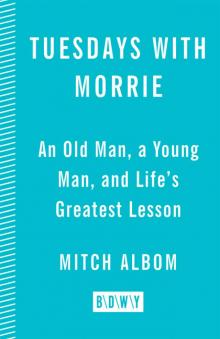 Tuesdays With Morrie
Tuesdays With Morrie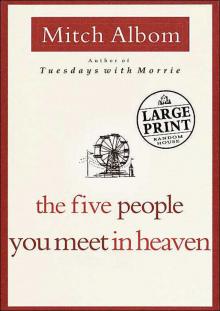 The Five People You Meet in Heaven
The Five People You Meet in Heaven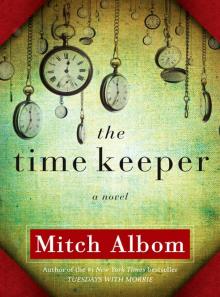 The Time Keeper
The Time Keeper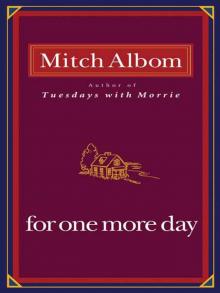 For One More Day
For One More Day The First Phone Call From Heaven: A Novel
The First Phone Call From Heaven: A Novel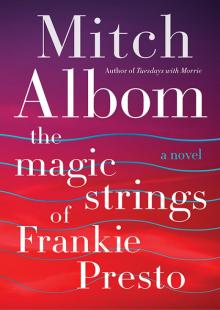 The Magic Strings of Frankie Presto
The Magic Strings of Frankie Presto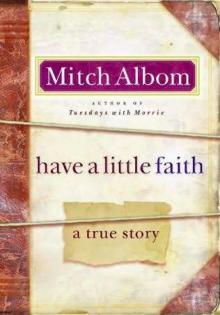 Have a Little Faith: A True Story
Have a Little Faith: A True Story The Next Person You Meet in Heaven
The Next Person You Meet in Heaven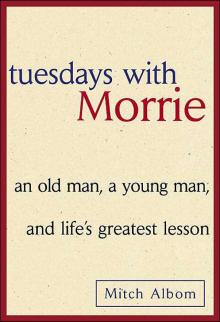 Tuesdays with Morrie: an old man, a young man, and life’s greatest lesson
Tuesdays with Morrie: an old man, a young man, and life’s greatest lesson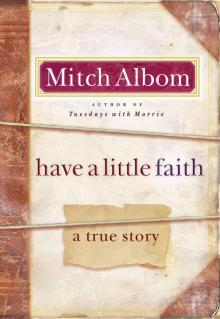 Have a Little Faith
Have a Little Faith